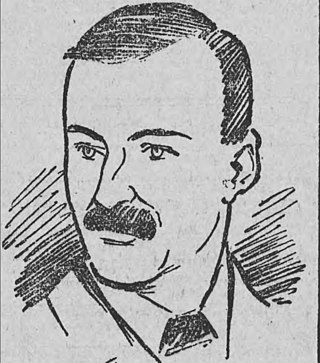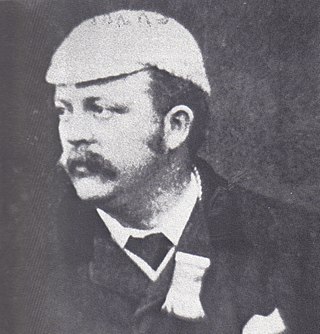The Welsh Rugby Union is the governing body of rugby union in the country of Wales, recognised by the sport's international governing body, World Rugby.

Swansea Rugby Football Club is a Welsh rugby union team which plays in the Welsh Premiership. The club play at St Helen's Rugby and Cricket Ground in Swansea and are also known as The Whites, in reference to their home kit colours.
Chepstow Rugby Football Club is a rugby union team from the town of Chepstow, in Monmouthshire, Wales. The club is a member of the Welsh Rugby Union and is a feeder club for the Dragons RFC with a Mini age groups from under 6's to under 16's.
Theophilus Aneurin Rees was a Welsh rugby union forward who represented Llandovery College at club level. He was capped once for Wales, in the country's very first international rugby match.

Evan James was a Welsh rugby half back who played club rugby for Swansea under the rugby union code, and professional rugby league for Broughton Rangers. While playing with Swansea, James was paired with his brother, David, and together they were nicknamed the 'Swansea gems' and the 'Curly haired marmosets'. The brothers were the centre of a controversial move to the league game in 1892 and switched codes twice in their careers. He had three younger brothers, Claude, Sam and Willie, the latter two playing at the same level as David and Evan towards the end of their careers.
David Hopkin "Glyn" Stephens was a Welsh international rugby union prop who played club rugby for Neath. He won 10 caps for Wales and captained his country. He was the father of Welsh rugby international, Rees Stephens and would later become president of the Welsh Rugby Union.
Glyn Prosser was a Welsh international rugby union flanker who played club rugby for Neath, and was capped four times for Wales. An aggressive wing forward, Prosser is best known for being a member of the Wales team that beat the touring New Zealanders in 1935.

Fred Leonard Perrett was a Welsh international rugby union prop who played club rugby for Neath. He won five caps for Wales, and in his first international game faced the touring South Africans.

Horace Sampson Lyne MBE was a Welsh international rugby union forward who played club rugby for Newport Rugby Football Club. He won five caps for Wales. After retiring from play, he became the longest serving president of the Welsh Rugby Union, and was one of six representatives that formed the International Rugby Board.
Rowland 'Rowley' Lewis Thomas was a Welsh international rugby union forward who played club rugby for London Welsh, of whom he was a founding member, and county rugby for Middlesex. Thomas played international rugby for Wales and was capped seven times.
Charles Henry Pugh was a Welsh international rugby union player who played rugby for three notable Welsh clubs, Aberavon, Maesteg and Neath. He was capped seven times for Wales and was part of the Welsh team that faced the touring 1924 New Zealand team.
David 'Dai' Hiddlestone was a Welsh international rugby union player who played club rugby for Neath. He was capped five times for Wales and was notable for leading an ill-advised response to the New Zealand Haka during the team's 1924 tour.

Richard Mullock was a Welsh sporting administrator and official, who is most notable for organising the first Welsh rugby union international game and was instrumental in the creation of the Welsh Football Union, which became the Welsh Rugby Union in 1934. Mullock came from an Anglo-Irish family; his family's firm in Wales, Henry Mullock & Son, was a printers based on Commercial Street in Newport, South Wales.
Lewis Cobden Thomas was a Welsh international rugby union forward who played club rugby for Neath and Cardiff Rugby Football Club and international rugby for Wales. In 1900 he became the Mayor of Neath.
Ernest Melville Rowlands was a Welsh international rugby union player who played rugby for St David's College, Lampeter, and international rugby for Wales.
Samuel Simmonds Clark was an English-born rugby union official and international rugby union full-back who played club rugby for Neath. Clark was the first Neath player to win an international cap for Wales while representing the club; and played in the second Welsh international match in 1882.

Thomas Williams was a Welsh rugby union forward who played club rugby for Cardiff and Pontypridd and international rugby for Wales. A solicitor by profession, Williams would later become a national selector for the Welsh Rugby Union. Williams was also responsible for suggesting the singing of the Welsh national anthem in a match in 1905, the first time a national anthem was sung before a sporting event.
Percy Bennett was an English-born international rugby union forward who played club rugby for Cardiff Harlequins and international rugby for Wales. He was the first player to represent his club in the Welsh team. At that time Cardiff Harlequins were one of the eight senior clubs in Welsh rugby.
David Harris Davies was a Welsh international rugby union forward who played club rugby for Neath and county rugby for Glamorgan. He won a single international cap, selected to play for Wales in 1904.

Howell Jones was a Welsh rugby union forward who played for the rugby club Neath and county rugby for Glamorgan. He gained just a single cap for the Wales national team in 1904. Jones came from a sporting family, and his son, Howie Jones, also represented Wales in rugby union.







